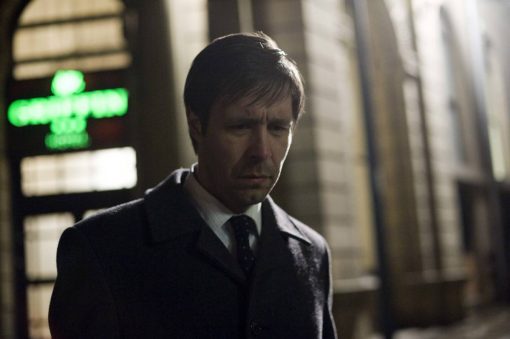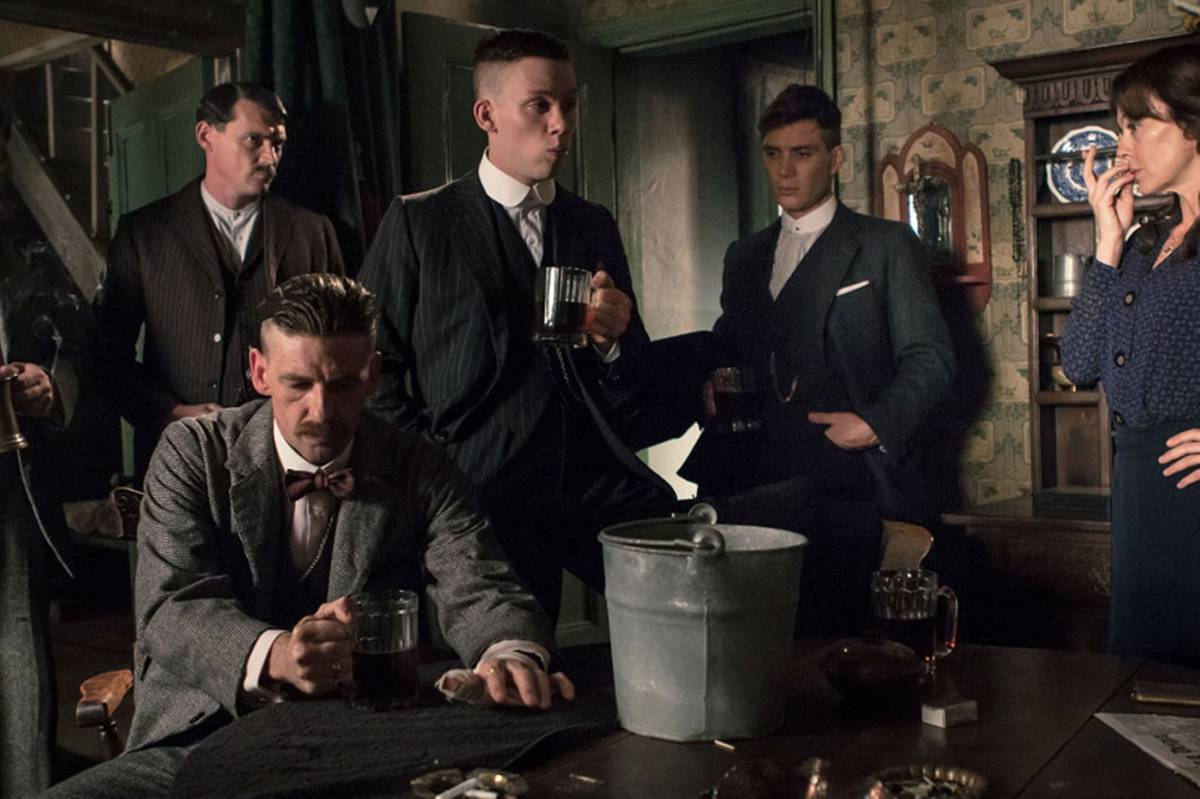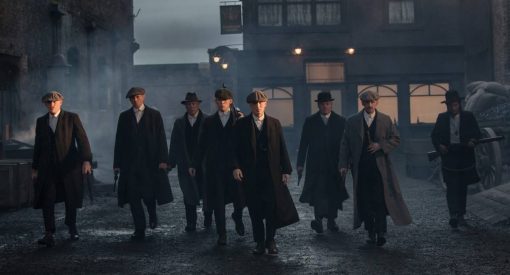Upon hearing in the early months of 2013 that the BBC had commissioned a new British drama series called Peaky Blinders, you could say that there was a certain degree of eye-rolling coming from yours truly. Now, this immediate skepticism was not due purely to the show’s title, although let’s face it ‘Peaky Blinders’ is about as intimidating a name for a gang as ‘The Little Rascals’. No, it was because over the last several years of my life there have been two words, that when put together, continue to leave a bitter and unpleasant taste in my mouth: British Drama.
Now I implore you to put down your pitchforks and torches for a moment and let me explain. This is not schoolyard bullying of British Television as a whole, far from it. Up until recently we held the distinguished title of being the kings of comedy. The Office is arguably one of, if not THE greatest comedy series of all time and yes, I fully understand the gravity of those words. When it comes to our educational and documentary programming we are still unmatched heroes. People across the world still worship at the feet of Sir Attenborough and more recently Mr Brian Cox (the physicist not the actor). However, when it comes to drama in jolly old Britannia, I’m always left with a recurring sense of monotony and frustration, yearning for that odd show that will spark my excitement and curiosity. A British drama that will ignite in me that unrelenting urge to hit the reminder button on my sky remote and force me to clear my schedule for that evening because… ‘I have to watch this!’

There are of course expectations to this, such as Sherlock Seasons 1-2 (Sorry 3, you don’t cut it) The Red Riding trilogy, Black Mirror and a few others in recent years but we are sorely lacking in consistency and imagination. As I flick through the TV guide there always appears to be an over abundance of either motionless costume dramas, in which they are still desperately striving to find new and stimulating ways of examining the tribulations of class warfare in Victorian England or we are left with recycled and formulaic detective dramas. Most see some no-nonsense woman solving a series of second-hand murder mysteries whilst coping with a [insert problem here]. Its tiresome and plus and at the moment it’s being accomplished with far better results by the Danish.
It’s horrifying and troubling to me that Doctor Who is now our biggest and most successful export. It’s shockingly considered by an unnerving amount of people and critics to be the pinnacle of British Drama. I have no words. I could very easily go on a mind-numbing and heated rant about why that simply isn’t true. I could do but in all honesty the show doesn’t deserve that. In my modest opinion, Doctor Who is a fantastic children’s television show, it really is, now that’s not meant to sound condescending or patronising. It’s a show that, to this day, wouldn’t be out of place on CBBC, it’s a great concept with wacky and wonderful characters and stories that are easy to follow. It’s a show that is brilliant for sitting down with children each week and enjoying the new adventures of the Doctor but somewhere along the line it has become more that that, the forefront of British television. Millions of fans, people and critics of ALL ages adore it. Just look at the commotion over the 50th Anniversary, I just don’t get it and perhaps, I never will.
In recent years, we all know our friends across the pond have been experiencing something special, a renaissance if you will, a new golden age of television. Shows like Breaking Bad, Mad Men, Game of Thrones, True Detective, House of Cards and The Gilmore Girls, OK perhaps not the last one, have all been unprecedented critical and commercial achievements. These shows and many like them have begun reshaping the industry itself. Television is no longer looked at as the second fiddle or the lesser cousin of its silver screen relation. It is, arguably, slowly becoming the dominant format. Some of Hollywood’s biggest names such as David Fincher (The Social Network, Gone Girl), Steven Soderbergh (Oceans 11, Contagion) and Cary Fukanga (Jane Eyre) have all turned their talents to TV. Now years prior to this new ‘golden age’, Hollywood directors such as these entering the realm of Television would have been seen as a demotion of sorts, filmmakers who were struggling to reclaim success on the big screen pottering away to the small one. However, these are not washed up filmmakers, far from it, they are some of Hollywood cinema’s most powerful and up-and-coming figures. Even the cult favourite David Lynch (Elephant Man, Eraserhead) has recently announced his return to television with a new series of Twin Peaks now in the works.
However, this irrefutable rise and continued success in the States has not gone unnoticed by us Brits. Some UK dramas in recent years have clearly attempted to recapture some of the triumph of US dramas. BBC’s The Hour, which only lasted two series, was unmistakably influenced and inspired by the hit American series Mad Men. The BBC has also announced in recent months that they have begun work on The Last Kingdom, a Viking Epic, which is said to be our answer to the phenomenon that is Game Of Thrones (and Vikings, equally). This mentality leads me on to Peaky Blinders, a show that has often been compared by many commentators to HBO’s Boardwalk Empire, despite the show’s creator stating he has never viewed the American crime series. Peaky Blinders takes place in 1919, in the seedy heart of post-war Birmingham and centres on the Shelbys, a crime family who have empirical ambitions.
Back to 2013, after having overcome my initial skepticism, I read up on the show’s premise and was made aware that it was to star one of the most underrated and criminally underused actors of our time, Cillian Murphy. The casting of Hollywood actors in television is another lesson the BBC has taken from our American cousins. Kevin Spacey, Woody Harrelson, Steve Buscemi, Kevin Bacon and Michael Sheen have all made the transitions to television in recent years and it appears to have paid off. Many garnering rave reviews and award nominations. It can, in some cases, also breathe new life into a career and help get an actor back on course, as it did with Matthew McConaughey and his ‘McConaissance’. Let’s just say that with Peaky Blinders’ interesting ambition, unique setting and its inclusion of a big Hollywood name as it’s lead, you could say it ‘peaked’ my interest (see what I did there?). However, deep within me was that same feeling of cynicism and caution. I didn’t want to get my hopes up only for them to be torn up in front of me. So on the 12th of September 2013, along with 3 million other people, I sat down and tuned into for first episode.
Now, over one year and ten hours of viewership later I’m currently writing this article with only two episodes left to air from the second season and I’m going to try and persuade you start watching this fantastic show.
Some of the coverage you find on Cultured Vultures contains affiliate links, which provide us with small commissions based on purchases made from visiting our site.


